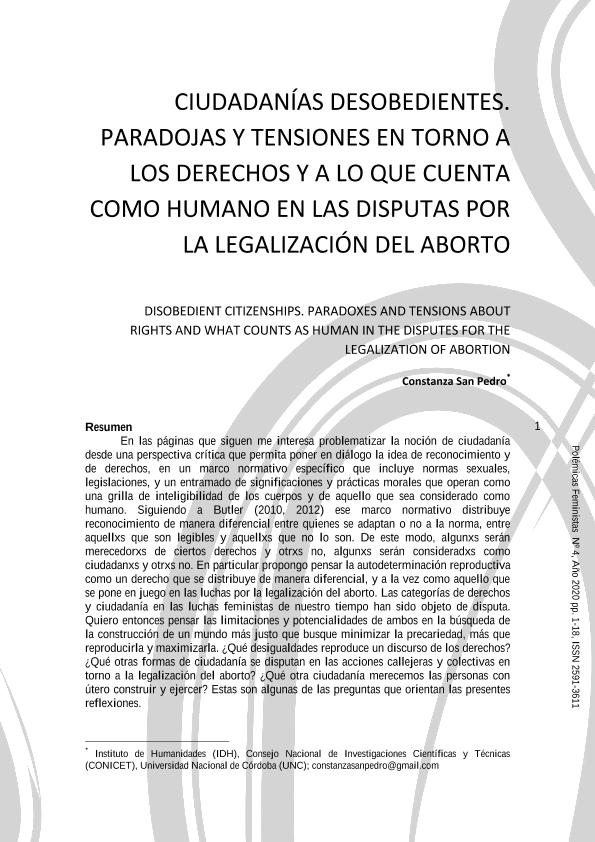Artículo
El artículo busca problematizar la noción de ciudadanía desde una perspectiva crítica que permita poner en diálogo la idea de reconocimiento y de derechos, en un marco normativo específico que incluye normas sexuales, legislaciones, y un entramado de significaciones y prácticas morales que operan como una grilla de inteligibilidad de los cuerpos y de aquello que sea considerado como humano. Siguiendo a Butler (2010, 2012) ese marco normativo distribuye reconocimiento de manera diferencial entre quienes se adaptan o no a la norma, entre aquellxs que son legibles y aquellxs que no lo son. De este modo, algunxs serán merecedorxs de ciertos derechos y otrxs no, algunxs serán consideradxs como ciudadanxs y otrxs no. En particular propongo pensar la autodeterminación reproductiva como un derecho que se distribuye de manera diferencial, y a la vez como aquello que se pone en juego en las luchas por la legalización del aborto. Las categorías de derechos y ciudadanía en las luchas feministas de nuestro tiempo han sido objeto de disputa. Quiero entonces pensar las limitaciones y potencialidades de ambos en la búsqueda de la construcción de un mundo más justo que busque minimizar la precariedad, más que reproducirla y maximizarla. ¿Qué desigualdades reproduce un discurso de los derechos? ¿Qué otras formas de ciudadanía se disputan en las acciones callejeras y colectivas en torno a la legalización del aborto? ¿Qué otra ciudadanía merecemos las personas con útero construir y ejercer? Estas son algunas de las preguntas que orientan las presentes reflexiones. I am interested in problematizing, in the following pages, the notion of citizenship from a critical perspective that will enable a dialogue between the ideas of recognition and rights, within a specific normative frame that includes sexual norms, legislations, and a network of moral meanings and practices that operate as a grid of intelligibility of bodies and of that which is considered human. According to Butler (2010, 2012) this normative frame distributes recognition in a differential way between those who adapt to the norm and those who do not, between those who are legible and those who are not. Thus, some will be worthy of certain rights and others will be not, some will be considered as citizens and others will be not. In particular, I propose to think the right to reproductive self-determination as one of those that are distributed in a differential way, and at the same time what which is put at stake in the struggles for the legalization of abortion. The categories of rights and citizenship, in the feminist struggles of our time, have been disputed. I want to think about the limitations and potentialities of striving for the construction of a fairer world that minimize precariousness, rather than reproducing and maximizing it. What inequalities does a discourse of rights reproduce? What other forms of citizenship are built by collective actions developped in the streets for the legalization of abortion? What other citizenship do we, the people with wombs, deserve to build and exercise? These are some of the questions that guide these reflexions.
Ciudadanías desobedientes. Paradojas y tensiones en torno a los derechos y a lo que cuenta como humano en las disputas por la legalización del aborto
Título:
Disobedient citizenships: Paradoxes and tensions about rights and what counts as human in the disputes for the legalization of abortion
Fecha de publicación:
03/2021
Editorial:
Universidad Nacional de Córdoba. Facultad de Filosofía y Humanidades. Centro de Investigaciones “María Saleme de Burnichon”. Área Feminismos, Género y Sexualidades
Revista:
Polémicas Feministas
ISSN:
2591-3611
Idioma:
Español
Tipo de recurso:
Artículo publicado
Clasificación temática:
Resumen
Palabras clave:
CIUDADANIA Y DERECHOS
,
MARCO
,
PRECARIEDAD
,
ABORTO
Archivos asociados
Licencia
Identificadores
Colecciones
Articulos(IDH)
Articulos de INSTITUTO DE HUMANIDADES
Articulos de INSTITUTO DE HUMANIDADES
Citación
San Pedro, Constanza; Ciudadanías desobedientes. Paradojas y tensiones en torno a los derechos y a lo que cuenta como humano en las disputas por la legalización del aborto; Universidad Nacional de Córdoba. Facultad de Filosofía y Humanidades. Centro de Investigaciones “María Saleme de Burnichon”. Área Feminismos, Género y Sexualidades; Polémicas Feministas; 4; 3-2021; 1-18
Compartir




